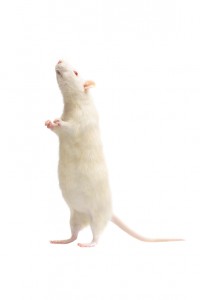Antidepressants and Ketamine Induce Resilience in Animals Susceptible to Depression-Like Behavior
 To study depression in humans, researchers look to rodents to learn more about behavior. Rodents who are repeatedly defeated by more aggressive animals often begin to exhibit behavior that resembles depression. At the 2014 meeting of the International College of Neuropsychopharmacology (CINP), researcher Andre Der-Avakian reported that in a recent study, repeated experiences of social defeat led to depressive behavior in a subgroup of animals (which he calls susceptible), but not in others (which he calls resilient). Among many biological differences, the resilient animals showed increases in neurogenesis in the dentate gyrus of the hippocampus.
To study depression in humans, researchers look to rodents to learn more about behavior. Rodents who are repeatedly defeated by more aggressive animals often begin to exhibit behavior that resembles depression. At the 2014 meeting of the International College of Neuropsychopharmacology (CINP), researcher Andre Der-Avakian reported that in a recent study, repeated experiences of social defeat led to depressive behavior in a subgroup of animals (which he calls susceptible), but not in others (which he calls resilient). Among many biological differences, the resilient animals showed increases in neurogenesis in the dentate gyrus of the hippocampus.
Chronic treatment of the susceptible animals with the selective serotonin reuptake inhibitor (SSRI) antidepressant fluoxetine or the tricyclic antidepressant desipramine, which both increase neurogenesis, also reversed the depressive behavior in about half of the animals. A single injection of the anesthetic ketamine (which has rapid-acting antidepressant effects in humans) reversed social avoidance behavior in about 25% of the animals. One depression-like symptom was anhedonia (loss of pleasure from previously enjoyed activities), which researchers measured by observing to what extent the animals engaged in intracranial self-stimulation, pressing a bar to stimulate the brain pleasurably. The effectiveness of the drugs in inducing resilient behavior was related to the degree of anhedonia seen in the animals. The drugs worked less well in the more anhedonic animals (those who gave up the intracranial stimulation more easily, indicating that they experienced less reward from it.)

